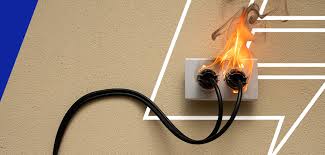- Immediate response to electrical issues can prevent fires, injuries, and extensive property damage.
- Recognizing early warning signs is essential for timely intervention.
- Regular maintenance and professional inspections reduce the likelihood of emergencies.
Electrical emergencies rarely come with a warning and can rapidly transform a safe environment into a hazardous one. Whether it’s a sudden power outage, a burning smell from an outlet, or the shock of flickering lights, the ability to respond quickly directly impacts whether a minor problem escalates into a major disaster. For immediate assistance, residents needing Wilmington, NC emergency electrical repairs by licensed electricians should know where to turn—prompt action can mean the difference between a simple fix and extensive damage or harm.
Far too often, electrical issues are ignored until it is too late, and the statistics from the U.S. Fire Administration reflect the gravity of waiting: electrical failures contribute to tens of thousands of residential fires annually. Not only does a swift response minimize risk to family and property, but it also plays a crucial role in protecting neighborhoods from hazardous situations. In this article, you’ll learn how early detection, timely intervention, and ongoing vigilance can keep everyone safer.
Recognizing the unique dangers posed by faulty wiring, damaged circuits, or outdated systems, homeowners and business operators should prioritize electrical safety as a part of routine maintenance. When in doubt, seeking help from trusted professionals is always best, rather than taking risky DIY shortcuts during emergencies. Acting quickly is not just about fixing a problem—it’s an investment in your peace of mind and the overall safety of your community.
Understanding the various types of electrical emergencies and knowing how to respond can help you prepare for situations that may arise unexpectedly. Education, readiness, and professional support form the most vigorous defense against electrical hazards, safeguarding your environment for years to come.
Delaying your response when confronted with electrical concerns may result in dire consequences. According to the U.S. Fire Administration, nearly 24,000 residential house fires annually are due to electrical malfunctions, causing billions in property damage and hundreds of deaths and injuries yearly. Rapid intervention slows the escalation of hazards and can halt what might have been a devastating fire or life-threatening shock. Acting promptly is always safer and far less costly than addressing the aftermath of a severe incident.
Knowing what qualifies as an electrical emergency helps you react appropriately. Some of the most prevalent electrical emergencies include:
- Power Outages can disrupt vital services and compromise security if caused by internal faults or storms.
- Electrical Fires: Often sparked by overloaded outlets, faulty appliances, or deteriorated wiring, these require instant evacuation and emergency services.
- Electric Shocks: Can happen due to exposed wires or defective equipment, signaling a critical underlying hazard.
- Downed Power Lines are extremely dangerous and should never be approached; always notify the electric utility or emergency responders.
Prompt recognition and swift contact with the right professionals are essential. Never attempt to resolve structural electrical emergencies without the proper training and gear.
Many electrical emergencies offer subtle warnings before turning severe. Learning to recognize these signs ensures you take action before problems spiral:
- Burning Smell: Persistent odd odors around switches or outlets often signal smoldering insulation or wiring problems.
- Flickering or Dimming Lights: Consistently flickering bulbs may indicate overloaded circuits or loose wires.
- Warm or Discolored Outlets: Excess heat or dark marks on outlets should always be investigated immediately.
- Buzzing or Crackling Noises: Sounds from outlets, switches, or breaker panels are abnormal and need prompt inspection.
If any of these issues appear, shut down the circuit at the breaker (if safe to do so) and contact a licensed electrician without delay. Ignoring these warnings can weaponize your electrical system against your property and its occupants.
- Ensure Safety: Immediately evacuate anyone in danger and keep a safe distance from the affected zone.
- Shut Off Power: If conditions allow, turn off your main electrical panel to prevent further escalation.
- Contact Professionals: Call 911 for fires or significant hazards, then alert a licensed electrician to address the root cause.
- Document the Incident: Record the situation using photos or notes to support future insurance or repair claims.
Quick, calm, and informed actions can contain the scope of an emergency and facilitate a safe, thorough repair.
The most effective way to avoid electrical emergencies is with ongoing prevention:
- Regular Inspections: Schedule annual or bi-annual professional checks to spot risks before they cause damage.
- Upgrade Outdated Wiring: Old, frayed, or ungrounded electrical systems should be brought up to code immediately.
- Install Safety Devices: To mitigate the risks of surges and shorts, use surge protectors, GFCIs, and arc-fault circuit interrupters (AFCIs).
- Educate Household Members: Teach your family to identify potential hazards and how to respond quickly in an emergency.
Preventive action reduces the odds of a crisis and extends the lifespan of your entire system, giving you greater confidence in your home’s safety.
Licensed electricians are an essential resource for both emergency and preventive electrical services. From diagnosing unusual symptoms to performing code-compliant upgrades and repairs, their expertise ensures safety and reliability throughout your property. In an emergency, their immediate intervention can stop damage and prevent harm to residents and responders alike.
Routine consultations and scheduled inspections by qualified professionals provide peace of mind and help eliminate hidden dangers. Engaging a licensed electrician safeguards your home, property value, and the well-being of everyone inside.
Quick response is the most effective way to prevent electrical hazards before they become catastrophic. By remaining vigilant, understanding warning signs, and prioritizing professional maintenance, you ensure that minor electrical issues never have the chance to develop into major threats. Protect your home and loved ones by staying prepared and partnering with the experts when it matters most.
